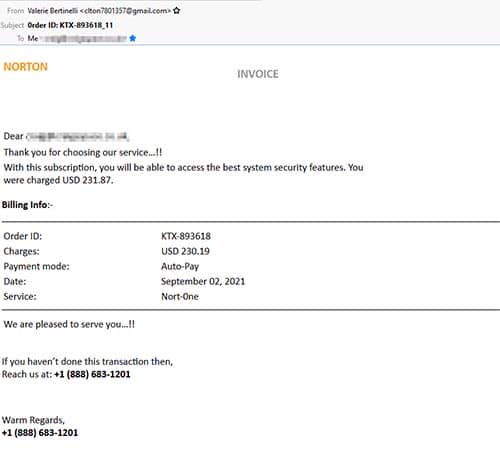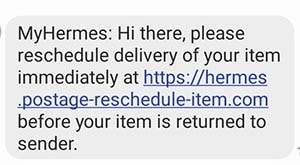5 online Black Friday scams to watch out for in 2021
The busiest shopping season of the year is upon us again, and again this means that online scammers will be out in full force trying to scam us all out of our hard earned money. We outline the top scams you can expect to see during the Black Friday sales of 2021.
Counterfeit Ads on Facebook
Throughout 2021 we’ve warned a number of times about the rise in counterfeit goods being sold using Facebook’s Sponsored Ads platform, and perhaps unsurprisingly Facebook hasn’t been able to keep up with getting them taken down. And this is only going to get worse as we enter the holiday season.
An example of such a post is below versus what was received.

So be especially wary of Facebook Ads this year. If they take you to websites you’ve never heard of, and the deals appear too good to be true, there is a good chance that it’s going to be a scam. In fact, unless you know and trust either the Facebook page publishing the advert or the website you are directed to, you should be assuming it’s a scam until proven otherwise.
Be especially wary of ads offering “unclaimed packages” and electronics products. More information on these scams can be seen here.
Like and Share this Post
It isn’t just ads you should be looking out for. Fake Facebook competitions are an ever-present threat on the social media platform and they’ll be surging once again as the sale seasons hit cyberspace.
Facebook posts that ask you to like and share them in order to win an expensive prize are a common hook for scammers and spammers to entice Facebook users down a rabbit hole. Such requests for engagement are usually followed by requests to “confirm” your entry by clicking a link leading to external websites.

And these websites are notorious for being spammy marketing websites intent on sucking up as much personal information about a visitor in order to bombard them with all kinds of spam at a later date. And by later date, this usually means straight away. More on these scams here.
Sponsored Content. Continued below...
Dangerous email attachments: View your invoice/delivery instructions
![]()
It’s not just social media that you need to look out for. Malware-laced emails are also on the rise at this time of the year, as crooks exploit the fact that more people are online shopping right now than at any other point in the year.
Cyber crooks know that certain types of email are more likely to be accepted as genuine at this time of year. This can include emails that claim to have an invoice attached relating to a recent purchase, or emails claiming to be from delivery companies containing information about pending deliveries.
Because so many of us are expecting such emails after making online purchases, there is a higher chance these emails could be mistaken as genuine. But the attachments will harbor malware and will infect devices if opened.
Consequently we don’t recommend opening email attachments unless you can be confident that it is genuine. Assume all email attachments are dangerous, even if the email appears at first glace to come from a reputable source.
Fake “you’ve been charged” invoice emails
Phishing emails are another significant threat that many will likely come into contact this holiday season. There has been a surge in emails claiming you’ve been charged for a product or subscription, and to cancel you need to either click a link or phone a number. Check out the scam email below.

It’s a bluff, and the idea is to lure recipients into either clicking that link or calling that number and giving away sensitive information about themselves which is likely to then lead to identity theft or targeted scams launched against the victim.
Unless you’re absolutely confident that the sender is real, don’t click any links or phone any numbers in the email itself. If you recognise the brand and you’re not sure if the email is real, head over to their official website directly or use contact information you know to be genuine.
Sponsored Content. Continued below...
Emails and texts about pending deliveries
It’s not just malicious emails you need to worry about. There has been a rise in scam texts too. These will try and lure recipients into clicking links and entering personal information in the websites that those links direct to.

And again, scammers will be aware of what types of alerts we’re expecting, such as, for example, alerts about deliveries for purchases we’ve made online. This means the surge is fake “courier company” texts is going to continue. For example asking recipients to click a link to schedule a delivery, or to pay a delivery fee to reschedule a missed delivery.
These links will lead to phishing websites that will steal any information you enter into them. To avoid these scams, don’t click on links in emails. More advice is in our post here.
Continued below...
Thanks for reading, we hope this article helped, but before you leave us for greener pastures, please help us out.
We're hoping to be totally ad-free by 2025 - after all, no one likes online adverts, and all they do is get in the way and slow everything down. But of course we still have fees and costs to pay, so please, please consider becoming a Facebook supporter! It costs only 0.99p (~$1.30) a month (you can stop at any time) and ensures we can still keep posting Cybersecurity themed content to help keep our communities safe and scam-free. You can subscribe here
Remember, we're active on social media - so follow us on Facebook, Bluesky, Instagram and X
